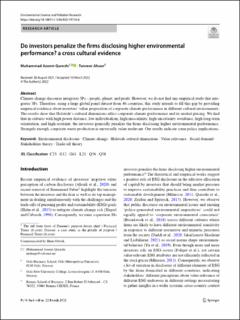Do investors penalize the firms disclosing higher environmental performance? A cross cultural evidence
| dc.contributor.author | Qureshi, Muhammad Azeem | |
| dc.contributor.author | Ahsan, Tanveer | |
| dc.date.accessioned | 2022-04-04T09:21:17Z | |
| dc.date.available | 2022-04-04T09:21:17Z | |
| dc.date.created | 2022-03-22T18:08:21Z | |
| dc.date.issued | 2022 | |
| dc.identifier.issn | 0944-1344 | |
| dc.identifier.uri | https://hdl.handle.net/11250/2989476 | |
| dc.description.abstract | Climate change discourse integrates 3Ps – people, planet, and profit. However, we do not find any empirical study that integrates 3Ps. Therefore, using a large global panel dataset from 46 countries, this study intends to fill this gap by providing empirical evidence about investors’ value proposition of corporate climate performance in different cultural environments. The results show that Hofstede’s cultural dimensions affect corporate climate performance and its market pricing. We find that in cultures with high power distance, low individualism, high masculinity, high uncertainty avoidance, high long-term orientation, and high restraint, the investors generally penalize the firms disclosing higher environmental performance. Strangely enough, corporate waste production is universally value irrelevant. Our results indicate some policy implications. | en_US |
| dc.language.iso | eng | en_US |
| dc.subject | Environmental disclosure | en_US |
| dc.subject | Climate change | en_US |
| dc.subject | Stakeholders theory | en_US |
| dc.subject | Value relevance | en_US |
| dc.subject | Cross-cultural communication | en_US |
| dc.subject | Hofstede cultural dimensions | en_US |
| dc.title | Do investors penalize the firms disclosing higher environmental performance? A cross cultural evidence | en_US |
| dc.type | Peer reviewed | en_US |
| dc.type | Journal article | en_US |
| dc.description.version | publishedVersion | en_US |
| cristin.ispublished | true | |
| cristin.fulltext | original | |
| cristin.qualitycode | 1 | |
| dc.identifier.doi | https://doi.org/10.1007/s11356-022-19716-8 | |
| dc.identifier.cristin | 2011810 | |
| dc.source.journal | Environmental science and pollution research international | en_US |
Tilhørende fil(er)
Denne innførselen finnes i følgende samling(er)
-
Publikasjoner fra Cristin [3269]
-
SAM - Handelshøyskolen [392]
SAM - Oslo Business School
